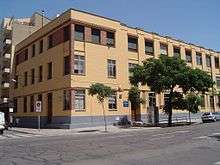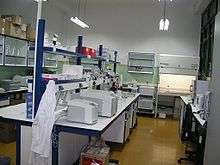Institute for Biocomputation and Physics of Complex Systems
 | |
| Established | 8 October 2002 |
|---|---|
| Location | Zaragoza, Aragón, Spain |
| Website | bifi.es |
The Institute for Biocomputation and Physics of Complex Systems (BIFI) (in Spanish "Instituto de Biocomputación y Física de Sistemas Complejos") is a research centre of the University of Zaragoza whose main objective is to apply computation to the physics of complex systems and biological models.
History

BIFI was founded in October 2002 by a group of lecturers from the Faculty of Science of the University of Zaragoza, belonging to the Theoretical Physics, Condensed Matter Physics and Biochemistry and Molecular Biology departments.
Since November 2003 BIFI is located at Edificio Cervantes in the Corona de Aragón street of the city of Zaragoza (Spain).
Research lines
The main objective of BIFI is to promote the interdisciplinary cooperation between biologists and physicists to apply biocomputation to the development of biological research through its convergence in experimental research.
The following are the main research fields developed at BIFI:
- Complex Materials and Fundamental Physics
- Computing and Supercomputing
- Complex Networks and Society
- Physics of Biological Systems
- Protein-Ligand Interaction
- Protein-Protein Interaction And Electron Transfer
- Protein Folding and Stability
- Molecular Biology and Crystallography
The activities of the institute include the organization of congresses and seminars. The institute has agreements and collaborations with industry.
Infrastructures
BIFI's facilities are located at Edificio Cervantes (a former children school of Zaragoza) in the Corona de Aragón street of the Aragonese capital.
The Supercomputing Laboratory hosts more than 200 CPUs spread among the cluster and the grid resources of the institute, globally exceeding 3 teraFLOPS of computing power. This makes BIFI the first supercomputing centre in Aragón and one of the first in Spain.
-

Supercomputing laboratory
-

Biochemistry laboratory